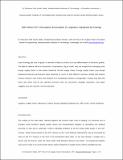| dc.contributor.author | Datta, Shoumen | |
| dc.date.accessioned | 2008-07-30T11:31:16Z | |
| dc.date.available | 2008-07-30T11:31:16Z | |
| dc.date.issued | 2008-07-30T11:31:16Z | |
| dc.identifier.uri | http://hdl.handle.net/1721.1/41897 | |
| dc.description | Will the future of tri-continental logistics and supply chain (Europe, Asia and Africa) likely to be shaped by energy resources and influenced by carbon footprints? | en |
| dc.description.abstract | Cost of energy per unit of goods or services is likely to evolve as a key differentiator of economic growth. The debt of nations will be re-structured. Corporations, big or small, may not escape from managing their energy supply chains or the carbon footprints of their supply chains. Energy supply chains may disrupt traditional physical and financial value networks so much so that different business models with diverse revenue streams may evolve and dissolve at a ‘clockspeed’ hitherto unimaginable. Eurasia may lead the storm and Africa may be the ultimate economic prize for uncommon strategic visionaries. This paper suggests why this scenario may be plausible. | en |
| dc.description.sponsorship | MIT Forum for Supply Chain Innovation
http://supplychain.mit.edu/shoumen | en |
| dc.language.iso | en | en |
| dc.subject | Logistics, Supply Chain, eBusiness, Nuclear Energy, Metabolic Engineering, ITER, STAR, carbon footprints | en |
| dc.title | WiFi Meet FuFi: Disruptive Innovation in Logistics Catalysed by Energy | en |
| dc.title.alternative | Carbon Footprint: Disruptive Innovation in Logistics Catalysed by Energy | en |
| dc.type | Working Paper | en |
| dc.contributor.department | Massachusetts Institute of Technology. Auto-ID Laboratory | |


